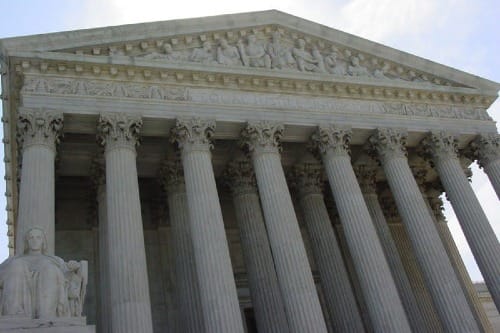Oil Companies Say Supreme Court Review "Urgently Needed" In Baltimore Climate Case

Oil and gas companies – defendants in a climate liability lawsuit brought by Baltimore – filed a response brief on July 15 in their petition before the U.S. Supreme Court arguing that the Court should resolve a question on the scope of appellate review of remand orders. According to the companies, there is a significant split among the federal appeals courts on this question, and the Supreme Court’s “review is urgently needed.”
Baltimore filed the suit to hold these companies – major producers of fossil fuels – liable for monetary damages to help pay for the localized impacts of climate change, impacts the city says are worsened by the companies’ alleged campaign of deception and denial to undermine the science and avoid climate action. The companies are waging a procedural battle to remove this case and similar climate lawsuits to federal courts, where they believe they have an easier path to dismissal. But four federal district judges and three federal appeals courts have now ruled that the cases should be remanded, or sent back, to state courts where they were originally filed. The companies are challenging these rulings.
In Baltimore’s case, the defendants filed a petition to the Supreme Court on March 31 seeking review of the Fourth Circuit Court of Appeal’s March 6 ruling upholding the federal district court’s remand order. Baltimore’s case is proceeding in state court even as defendants argue it should be in federal court.
Attorneys for Baltimore filed a response to the Supreme Court petition on June 29, arguing that the Fourth Circuit decision was correct and there is no significant split among federal appeals courts regarding the scope of review of remand orders.
The oil company defendants countered with a response filed July 15 saying there is indeed a significant split. They argue that a statutory provision (28 U.S.C. 1447d) providing an exception for appellate review of remand orders on two distinct grounds means that the entire remand order is reviewable, not just the two distinct grounds for removal. The distinct grounds for removal that is relevant in this case is the “federal officer” claim, where defendants argue they were “acting under” the authority of federal officials in their operations. Baltimore argued, and the Fourth Circuit agreed, that the appellate review is limited to only the federal officer issue. The defendants, however, claim the scope of review should be much broader.
Northwestern School of Law Professor James E. Pfander, an expert in federal jurisdiction and civil procedure, said the statute is clear that federal appellate review of remand orders is limited.
“The statute in 1447 does foreclose review of those [additional] issues [for removal] and accepting review of them will complicate and delay the appeal, precisely the result Congress wished to avoid with the statute,” he told Climate in the Courts via email.
He also said the federal officer issue has been too widely used by private parties seeking appellate review of remand orders.
“What I find really interesting is that the defendants focus entirely on the scope of appellate review question, rather than asking for a clarification of the meaning of the federal officer removal provision,” Pfander said. “That provision has, in my judgment, been too expansively interpreted, allowing a good deal of private litigation to flow into federal court on the theory that private parties were acting as the agents of the federal government.”
In this climate liability litigation, three federal appeals courts have rejected the oil companies’ claims that they were acting as federal officers.
The Supreme Court grants only a very small number of petitions it receives. The Court will decide on September 29, 2020 if it will consider the oil companies’ petition in Baltimore’s case.
Should the Court decline the petition, the companies will have little choice but to face litigation in Maryland state court, where they could eventually face discovery and a trial – stages they appear desperate to avoid.
As the companies conclude in their Supreme Court petition, “this Court’s review is urgently needed.”


